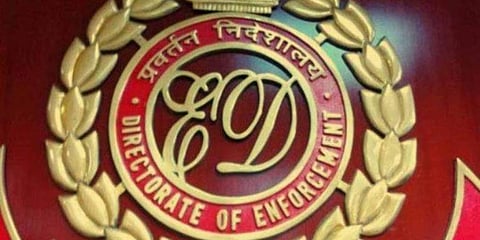

Indiscriminate arrests and being locked up in jail without trial was always a lot of the downtrodden and those without a voice. But now arbitrary detention has come to haunt those with means, businessmen and politicians who have fallen out with the establishment.
As individual liberties guaranteed under the Constitution shrink, it is chilling to realize the judiciary – mandated to protect personal freedom and the rule of law –is increasingly merging with the executive, and finding ‘reasonable grounds’ for the invasion of liberty.
What better example to illustrate this than the recent judgement by the Supreme Court upholding the draconian provisions of the Prevention of Money Laundering Act (PMLA)! The PMLA, enacted in 2002 and implemented on July 1, 2005, for the laudatory purpose of flushing out economic crime, has in recent days been ‘weaponized’ via its implementing agency – the Enforcement Directorate.
Though the PMLA was enacted by the NDA when L K Advani was Home Minister, it was ironically the Congress that implemented the Act in 2005. The PMLA was earlier a slow train in the Congress era; it has been fast-tracked since the Narendra Modi government came to power.
Sample this. The ED carried out 3,010 raids and attached ‘proceeds of crime’ worth Rs 99,356 crore under the PMLA over the last 8 years since the NDA came to power in 2014. In contrast, only 112 raids were conducted and Rs 5,346 crore were impounded between 2004-05 and 2013-14 during the tenure of the Congress-led United Progressive Alliance (UPA).
However, nobody is bothered about convictions. Just 23 persons have been actually convicted in the 5,422 cases registered under the PMLA since it was implemented 17 years ago. Significantly, the last financial year has been the most ‘productive’ with 1,180 cases registered in 2021-22.
This only proves Chief Justice N V Ramana’s constant refrain – the process is the punishment! Since PMLA’s inception, hundreds of establishments have been raided, thousands arrested, 992 cases prosecuted, Rs 869 crores confiscated, and over Rs one lakh crore of property attached / seized. And yet just 23 convictions! This means hundreds of those arrested, after the naming-and-shaming game, have been released, probably along with their property!
Rubber-stamping
The latest judgment by the apex court bench led by Justice A M Khanwilkar not only validates the use of the PMLA against the ‘heinous’ crime of money laundering but upholds the myriad amendments since 2014 that has widened the powers of the state.
Section 5 of the PMLA – which lays down powers regarding provisional attachment and confiscation of properties – was amended in 2015 and now empowers the ED to make emergency attachments of properties without a registered criminal case. The petitioners’ case, that this does away with the ‘due process’ of recording a FIR of an offence before confiscation or attachment of the property, has been rejected by the court.
The ED has extensive powers under Sections 16, 17 and 18 to enter any premise and carry out search and seizure operations. A 2019 amendment further widened these powers by doing away with the necessity of a court warrant. The pleas that the absence of sufficient safeguards renders these provisions arbitrary and open to misuse were dismissed by the court. The court contended that the process of searches and seizure under PMLA is not only for the purpose of inquiry but also for preventing crime.
Guilty until proven innocent
The Supreme Court has also rejected the challenge to Sections 24 and 45 on the grounds they reverse the burden of proof, violating the cornerstone of Anglo-Saxon law – that one is innocent until proven guilty.
Section 24 states that a court will presume an accused to be involved in money laundering unless proved contrary. Likewise, Section 45 imposes two conditions for bail in PMLA cases — first, a court must be satisfied that the accused is not guilty of money laundering and, second, he is not likely to commit any offence while on bail.
Significantly, these twin bail conditions were struck down by the Supreme Court earlier in 2017 where a bench of Justices Rohinton Nariman and Sanjay Kishan Kaul said the ‘twintest’ was unconstitutional and arbitrary. “We must not forget that Sec 45 is a drastic provision which turns on its head the presumption of innocence which is fundamental to a person accused of any offence.”
The ruling was negated by an amendment in 2018 which brought back the ‘twin bail’ conditions. Now that has been sanctified by the Supreme Court. It has said the presumption of ‘innocence’ is not a constitutional right, and that “presumption can be interdicted by a law made by Parliament / Legislature.”
The only glimmer of hope for those challenging the arbitrary provisions of the PMLA, are the petitions that have questioned the pushing through of the PMLA amendments as ‘money bills’. These have been referred to a Constitutional, seven-judge bench. If petitioners Jairam Ramesh and others succeed, the amendments via the Finance Act can be struck down as ‘unconstitutional’.Beyond this legal challenge, street protests to reverse the PMLA provisions are unlikely. The rich and mighty in ED’s line of sight will have to muddle through on a wing and a prayer.